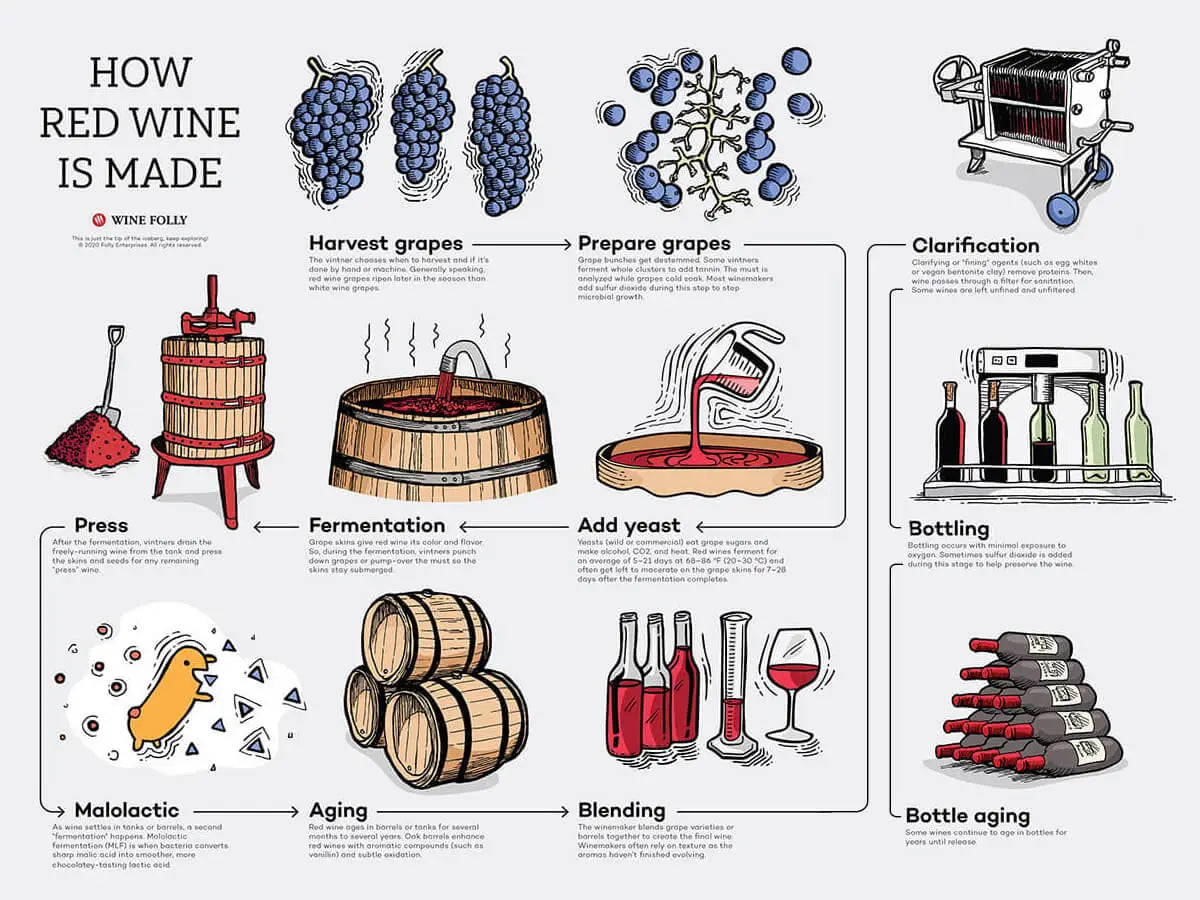A glass of wine has become a nightly ritual for many people, but what exactly is it that we're drinking? Many of us are familiar with the wonderful taste of our favourite wines, but not so much when it comes to the actual ingredients in them. Are there any health benefits from consuming wine? We'll explore all this and more in this article, so let's dive in and find out the answers to some of your questions on this fascinating beverage.

Let’s start with the ingredients. The main ingredients in red wine are grapes, water, yeast, and sometimes additional additives. Grapes are the primary ingredient and provide the sugars, acids, and flavours that are essential for the wine. The specific grape variety used, such as Cabernet Sauvignon or Merlot, greatly influences the taste.
During the winemaking process, yeast is added to ferment the sugars in the grape juice. This fermentation process converts the sugars into alcohol, carbon dioxide, and various flavour compounds. The yeast plays a significant role in determining the aromas and flavours in the wine.

Water is another essential ingredient in red wine, making up the majority of its content. It affects the overall texture and mouthfeel of the wine.
Additionally, winemakers may use certain additives to enhance or stabilize the wine. For example, sulphur dioxide is commonly added to prevent spoilage and oxidation.
The combination of grape variety, fermentation by yeast, and other factors like aging in oak barrels can greatly impact the taste of red wine. Grape variety contributes to the flavours and aromas, with different grapes offering varying levels of sweetness, acidity, and tannins. Fermentation by yeast produces alcohol, and various byproducts of fermentation contribute to the wine's flavours, such as fruity, floral, or earthy notes. Aging in oak barrels can add additional flavours like vanilla, spice, or smokiness.
Overall, the ingredients in red wine work together to create a complex interplay of flavours, ranging from fruity and floral to earthy and spicy, resulting in the diverse taste profiles that red wines are known for.

image courtesy of Wine Folly
So, with all these ingredients in red wine is it good for you? Moderate consumption of wine can have some potential health benefits, but it's important to note that excessive or heavy drinking can lead to numerous health problems. Here are some potential health benefits associated with moderate wine consumption:
- Antioxidants: Red wine, in particular, contains antioxidants like resveratrol, which may help protect against certain diseases. Antioxidants can neutralize harmful free radicals in the body and contribute to overall health.
- Heart health: Moderate red wine consumption has been linked to a lower risk of heart disease. Resveratrol and other compounds found in wine may help improve heart health by reducing inflammation, preventing blood clot formation, and increasing levels of "good" cholesterol (HDL).
- Blood pressure: Some studies suggest that moderate wine consumption may have a modest positive effect on blood pressure. However, excessive drinking can raise blood pressure, so moderation is key.
- Cognitive function: The antioxidants and polyphenols in wine have been associated with potential benefits for brain health. Some studies suggest that moderate wine consumption may help reduce the risk of cognitive decline and diseases like Alzheimer's.
- Diabetes: Some research indicates that moderate wine consumption, especially red wine, may improve insulin sensitivity and lower the risk of developing type 2 diabetes. However, it's crucial to maintain a healthy overall lifestyle to prevent diabetes.
It's important to note that the health benefits of wine are mainly associated with moderate consumption, which generally means up to one drink per day for women and up to two drinks per day for men. Excessive alcohol consumption can lead to addiction, liver damage, increased risk of certain cancers, and other serious health issues.
Individuals with certain health conditions or those at risk for alcohol-related problems should avoid alcohol altogether. It's always recommended to consult with a healthcare professional for personalized advice regarding alcohol consumption and its potential effects on your health.
